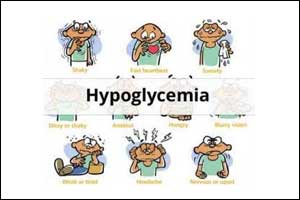- Home
- Editorial
- News
- Practice Guidelines
- Anesthesiology Guidelines
- Cancer Guidelines
- Cardiac Sciences Guidelines
- Critical Care Guidelines
- Dentistry Guidelines
- Dermatology Guidelines
- Diabetes and Endo Guidelines
- Diagnostics Guidelines
- ENT Guidelines
- Featured Practice Guidelines
- Gastroenterology Guidelines
- Geriatrics Guidelines
- Medicine Guidelines
- Nephrology Guidelines
- Neurosciences Guidelines
- Obs and Gynae Guidelines
- Ophthalmology Guidelines
- Orthopaedics Guidelines
- Paediatrics Guidelines
- Psychiatry Guidelines
- Pulmonology Guidelines
- Radiology Guidelines
- Surgery Guidelines
- Urology Guidelines
Clinicians lack resources to identify & manage Hypoglycemia patients : Study

Hypoglycemia is particularly common in adults who have type 2 diabetes and are 65 and older.Severe hypoglycemia can cause seizures, loss of consciousness and death.A new research from the Endocrine Society and Avalere Health has found that clinicians lack the resources to identify, assess and manage patients who are at a high risk of developing hypoglycemia.The analysis has been published in the Society's Journal of Clinical Endocrinology & Metabolism. The study shall prompt actions required to augment available resources for managing hypoglycemia and opportunities to incorporate better management strategies in clinical practice.
The analysis suggests that efforts to prevent hypoglycemia should focus on helping primary care providers identify high-risk patients who would most benefit from individualized glycemic targets and educating at-risk patients about how to recognize and appropriately manage hypoglycemic events.While some tools exist to help healthcare providers identify individuals at high risk of hypoglycemia, they are not in widespread use.
To develop the analysis, experts from the Society and Avalere Health conducted an environmental scan that examined clinical guidance documents, quality measures and their use in value-based purchasing programs, clinical tools and quality initiatives related to type 2 diabetes and hypoglycemia. The authors found more than 750 relevant scientific articles published in the last five years and examined 31 in detail.
Severe hypoglycemia can cause seizures, loss of consciousness and death. One recent meta-analysis concluded that individuals who take insulin to treat type 2 diabetes experience an average of 23 mild or moderate events and one severe hypoglycemic episode in a year.
"While hypoglycemia is well recognized as a threat among people with type 1 diabetes and their healthcare providers, the danger it poses to people with type 2 diabetes is underappreciated," said the Society's Chief Professional & Clinical Affairs Officer Robert W. Lash, M.D., the first author of the analysis. "In the past two decades, healthcare providers and patients have made important strides to achieve improved blood glucose control to prevent or delay complications such as heart, eye and kidney disease. However, we need to be aware that emphasizing these lower blood glucose goals may unintentionally put individuals with type 2 diabetes at greater risk of hypoglycemia."
A study of Medicare beneficiaries conducted between 1999 and 2011, for instance, found that quality metrics encouraging increased adherence to a targeted blood glucose goal had successfully reduced hospital admission rates for hyperglycemia, or elevated blood glucose levels, but hospitalizations resulting from hypoglycemia rose during the same timeframe.
The environmental scan paves the way for the Society's Hypoglycemia Prevention Initiative to improve outcomes in individuals with type 2 diabetes. The Initiative will include a pilot study to test ways to address the clinical care gaps identified in the analysis.
The Initiative's goals include identifying patients who are at high risk in a timely manner, supporting appropriate clinical interventions that can be administered in primary care providers' offices and clinics, and decreasing the frequency and severity of hypoglycemia episodes. The effort brings together various healthcare stakeholders including endocrinologists, primary care providers, health plans, diabetes educators, and individuals with type 2 diabetes.
"The current landscape clearly demonstrates the need to address hypoglycemia as a routine part of clinical care for individuals with type 2 diabetes," Lash said. "Now that we understand the full scope of the issue, the Society's Hypoglycemia Prevention Initiative is poised to develop needed support tools for clinicians and to raise awareness of the problem among both healthcare providers and people with diabetes."
For more details click on the link: http://dx.doi.org/10.1210/jc.2017-02804

Disclaimer: This site is primarily intended for healthcare professionals. Any content/information on this website does not replace the advice of medical and/or health professionals and should not be construed as medical/diagnostic advice/endorsement or prescription. Use of this site is subject to our terms of use, privacy policy, advertisement policy. © 2020 Minerva Medical Treatment Pvt Ltd